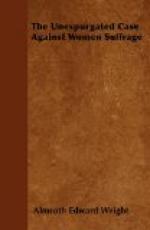Lastly, the suffragist fails to see that the function of framing the laws is not an essential function of citizenship.
The essential functions of citizenship are the shaping of public policy, and the control of the administrative Acts of Government.
Such directive control is in a state of political freedom exercised through two quite different agencies.
It is exercised—and it is of the very essence of political freedom that this should be the normal method of control—in the first place, through expressed public opinion. By this are continuously regulated not only momentous matters of State, such as declarations of war and the introduction of constitutional changes, but also smaller and more individual matters, such as the commutation of a capital sentence, or the forcible feeding of militant suffragists.
In the background, behind the moral compulsion of expressed public opinion, there is, in the case of a Parliamentary State, also another instrument of control. I have in view that periodical settlement of the contested rulership of the State by the force of a majority of electors which is denoted a general election.
The control exercised by the suffrages of the electors in a general election is in certain important respects less effective than that exercised by the everyday public expression of opinion. It falls short in the respect that its verdicts are, except only in connexion with the issue as to whether the Government is to be retained in office or dismissed, ambiguous verdicts; further, in the respect that it comes into application either before governmental proposals have taken definite shape, or only after the expiration of a term of years, when the events are already passing out of memory.
If we now consider the question of woman’s franchise from the wider point of view here opened up, it will be clear that, so far as concerns the control which is exercised through public opinion on the Government, the intelligent woman, and especially the intelligent woman who has made herself an expert on any matter, is already in possession of that which is a greater power than the franchise. She has the power which attaches to all intelligent opinion promulgated in a free State. Moreover, wherever the special interest of women are involved, any woman may count on being listened to if she is voicing the opinions of any considerable section of her sex.
In reality, therefore, woman is disfranchised only so far as relates to the confirmation of a Government in office, or its dismissal by the ultima ratio [ultimate reason] of an electoral contest. And when we reflect that woman does not come into consideration as a compelling force, and that an electoral contest partakes of the nature of a civil war, it becomes clear that to give her the parliamentary vote would be to reduce all those trials of strength which take the form of electoral contests to the level of a farce.




